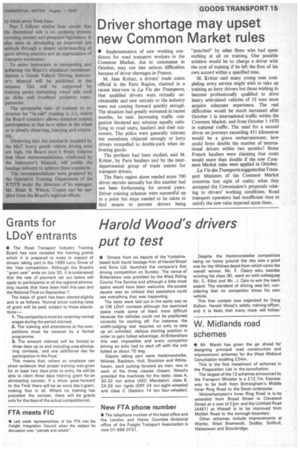Driver shortage may upset new Common Market rules
Page 17

If you've noticed an error in this article please click here to report it so we can fix it.
• Implementation of new working con ditions for road transport workers in the Common Market, due to commence in October, may run into serious difficulties because of driver shortages in France.
M. Jean Kritter, a drivers' trade union official in the Paris Region, claimed in a recent interview in La Vie des Transports, that qualified drivers were virtually unobtainable and new recruits to the industry were not coming forward quickly enough. The situation had greatly worsened in recent months, he said. Increasing traffic congestion hindered any solution equally satisfying to road users, hauliers and their customers. The police were generally tolerant but sometimes objected strongly to lorry drivers compelled to double-park when delivering goods.
The problem had been studied, said M. Kritter, by Paris hauliers and by the interdepartmental group of trade unions for transport drivers.
The Paris region alone needed some 700 driver recruits annually but this number had not been forthcoming for several years. Driver training schemes were successful up to a point but steps needed to be taken to .find means to prevent drivers being "poached" by other firms who had spent nothing at all on training. One possible solution would be to charge a driver with the cost of training if he left the firm of his own accord within a specified time.
M. Kritter said many young men completing army service might wish to take up training as lorry drivers but those wishing to become professionally qualified to drive heavy articulated vehicles of 35 tons must acquire adequate experience. The real difficulties would be much increased after October I in international traffic within the Common Market, and from October 1 1970 in national traffic. The need for a second driver on journeys exceeding 451 kilometres would be a grave embarrassment; how could firms double the number of international drivers within two months? Some French hauliers were claiming that costs would more than double if the new Common Market rules were applied in October.
La Vie des Transports suggests that Transport Ministers of the Common Market countries lost sight of reality when they accepted the Commission's proposals relating to drivers' working conditions. Road transport operators had insufficient time to satisfy the new rules imposed upon them.


































































































